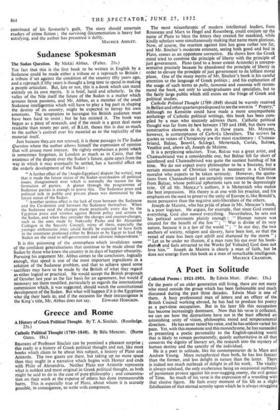Sudanese Spokesman'
The Sudan Question. By Mekki Abbas. (Faber. 21s.) THE fact that this is the first book to be written in English by a .Sudanese could be made either a tribute or a reproach to Britain : a tribute if set against the condition of the country fifty years ago, and a reproach if fifty years is thought a long time to spend in making a people articulate. But, late or not, this is a.book which can stand entirely on its own merits. It is brief, lucid and scholarly. In the valley of the Nile itself the future of the Sudan is a matter which arouses fierce passions, and Mr. Abbas, as a member of the small Sudanese intelligentsia which will have to play a big part in shaping the destiny of its country, might be expected to betray his own emotions. The .temptation to harangue his British audience must have been hard to resist ; but he has resisted it. The book was begun as a piece of research, and if the result is a great deal more readable than ninety per cent. of B.Litt. theses this is due as much to the author's control over his material as to the topicality of the material itself.
Just because they-are not stressed, it is those passages in The Sudan Question where the author allows himself the expression of opinion that will arouse most interest. He rightly emphasises a point which is sometimes forgotten, in London as much as in Cairo, that the existence of the dispute over the Sudan's future, quite apart from the way in which it may eventually be settled, has a harmful effect on the orderly development of the Sudan :
" A further effect of the [Anglo-Egyptian] dispute [he writes], was that it made the future status of the Sudan overshadow all political issues, disagreement over which is normally the -reason for the formation of parties. A glance through the programmes of Sudanese parties is enough to prove this. The Sudanese press and political talk in public and private places was dominated by the future status of the Sudan.
" Another serious effect is the lack of trust between the Sudanese and the Co-domini and between the Sudanese themselves. When the Sudanese read the charges made practically every day by the Egyptian press and wireless against British policy and actions in the Sudan, and when they consider the charges and counter-charges, such as the ones made by Nokrashy Pasha and Sir Alexander Cadogan in the Security Council, many of them, especially the younger enthusiastic ones, could hardly be expected to have faith in the intentions professed either by Britain or by Egypt to lead the Sudan on the road to self-government and ultimate independence."
It is this poisoning of the atmosphere which invalidates some of the confident generalisations that continue to be made about the Sudan by those who knew the country in its days of happier obscurity. Pursuing his argument Mr. Abbas comes to the conclusion, logically enough, that speed is one of the most important ingredients in a solution of the Sudanese problem, and that to achieve speed some - sacrifices may have to be made by the British of what they regard as either logical or practical. He would accept the British proposals of October last year as the fair basis for an agreement, but would if necessary see them modified, particularly as regards the international commission which, it was suggested, should watch the constitutional development of the Sudan. But what will happen if it is the Egyptians who dig their heels in and if the occasion for their intransigence is
the King's title, Mr. Abbas does not say. EDWARD HODGKIN.


































 Previous page
Previous page